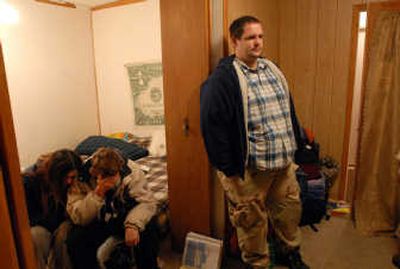Volunteer helped find homes for former tent city residents

The day before the tent city on a vacant lot in northeast Spokane closed late last year, James Coltson and his common-law wife, Brandee Harding, had no idea where they would go.
“We’ll be back on the street or in the woods,” Coltson told The Spokesman-Review at the time. The young couple, no strangers to homelessness, would get by somehow as they always had on their trek from Florida to Washington.
But Spokane has a way of coming through for the truly needy. James and Brandee were given a place to live and a chance to get back on their feet, thanks in large part to a 53-year-old AmeriCorps volunteer with connections to landlords who own affordable housing.
“I’m doing this because I care, and I know how to get people help,” said Terri Mayer, whose compassion for the homeless was shaped by her brother’s failed struggle with alcoholism.
Mayer was able to find housing and some social services for 16 of the 32 people living at the tent city at Sinto Avenue and Napa Street when Realtor Robert Gilles – under mounting pressure from the city – ordered them off his property by Dec. 1.
Gilles had allowed the homeless and their advocates to squat on his property after the group was kicked out of its more conspicuous campsite on the grassy median at Riverside Avenue and Monroe Street in late October.
Mayer can only guess what became of the 16 others who did not take advantage of her offer to help. She believes some had places to live and chose to be part of the tent city scene anyway.
Of the 16 who asked for help, she said, three entered inpatient drug rehabilitation; two entered the Lord’s Ranch, a residential Christian discipleship program north of Spokane; one has returned to life on the streets; and 10 found permanent or temporary low-income housing in Spokane.
“Every person that finds housing is one less we have to worry about,” Mayer said.
The future is far from secure for James and Brandee, but for the moment they have a warm place to sleep, on the floor of a modest North Perry duplex they share with three other former tent city residents. The group was able to work out a deal with the landlord to pay their security deposit in installments.
The landlord agreed to those terms provided the tenants participate in Responsible Renters, a program designed by case managers from nine social service agencies to teach homeless people the skills necessary to become stable and find permanent housing.
Goodwill Industries is helping Coltson, who will turn 20 this month, recover his identification, which was stolen along with other personal items at the bus station when he arrived in Spokane.
Harding, 23, is receiving employment training and pay from Goodwill, which gets federal funds to help the homeless learn job skills.
In 2007, Goodwill received about $48,000, according to program manager Jack Lilienthal. He said the number of homeless persons seeking assistance at Goodwill nearly doubled last year. Many needed help getting birth certificates or photo IDs from other states – documents necessary to sign rental agreements and get jobs.Of the eight or 10 people who came to Goodwill from the tent city, Lilienthal said, three or four are still receiving help.